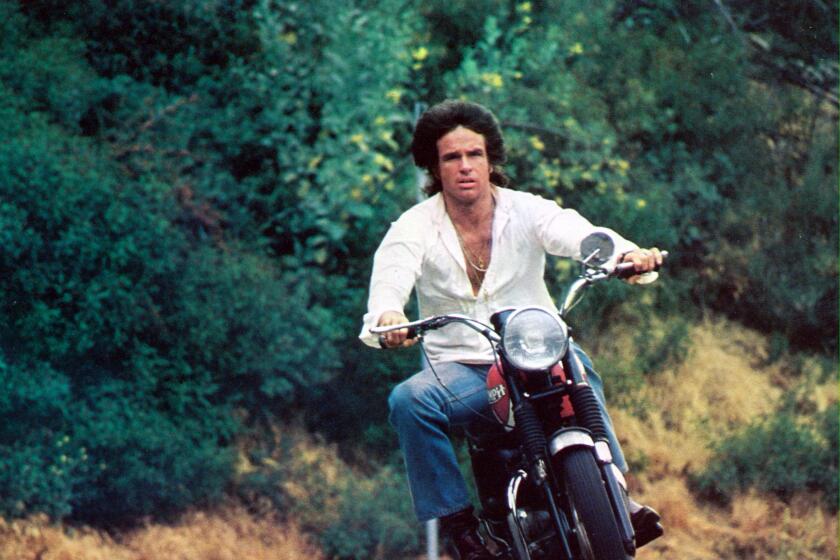Mank’s grandson tells all: A tragic portrait of the screenwriting brothers Mankiewicz
- Share via
On the Shelf
Competing With Idiots: Herman and Joe Mankiewicz, a Dual Portrait
By Nick Davis
Knopf: 384 pages, $30
If you buy books linked on our site, The Times may earn a commission from Bookshop.org, whose fees support independent bookstores.
The legend of the Mankiewicz brothers has always been with Nick Davis. Growing up, he was told that his grandfather, “Citizen Kane” screenwriter Herman J. Mankiewicz, was an iconoclast hero with no need for Hollywood posturing. He was also taught to regard his great-uncle, Joseph, as a fraudulent, womanizing try-hard.
The brothers had both come from New York to Hollywood, one after the other, to make some cash and flex their writing muscles, but they soon parted ways and forged starkly divergent careers. The good guy artiste and the bad guy sellout. Herman, full of bonhomie; Joseph, stiff and superficial.
Only later did Davis, now a filmmaker as well, realize the truth was more complicated. That disjunction between family lore and Hollywood reality compelled him to write his new book, “Competing With Idiots,” a subjective dual portrait of the Brothers Mankiewicz.
A tasty combination of film history, family album and psychological study, “Idiots” makes a fine companion to 2020’s “Mank,” the double Oscar winner from David Fincher, while going well beyond that movie’s focus on “Kane,” Herman’s 1941 masterpiece.
“Herman resented [Joe] for playing the game and for taking the game seriously, for succeeding at the game,” says Davis — who directed the new ESPN documentary “Once Upon a Time in Queens” — by phone from New York. “Herman and his pals, even the ones who succeeded, I think they felt like, ‘Yeah, let’s make the money and have some fun.’ And then, the next generation that came along treated it like an art form.”
Herman’s initial reaction: “‘Yeah, OK, whatever,’” Davis says. “But the next thing he knows, Joe has passed him on the ladder. And Herman’s like, ‘Oh, my God. Can you believe my idiot brother is directing another picture for Fox?’”
‘Mank’ is a gorgeous dive into film history — and a sharp reflection on our political present
Gary Oldman plays the Oscar-winning screenwriter Herman J. Mankiewicz in David Fincher’s drama about the origins of ‘Citizen Kane.’
The father of the boys, Franz, had a gift for undermining their self-confidence. Herman absconded to Hollywood first; prodigiously talented, he approached his job as a lark, drinking and gambling at least as much as he wrote. (The book takes its title from Herman’s 1926 telegram to New York playwright Ben Hecht: “MILLIONS ARE TO BE GRABBED OUT HERE AND YOUR ONLY COMPETITION IS IDIOTS. DON’T LET THIS GET AROUND”). Joseph, 11 years younger, arrived in the shadow of his raconteur brother; unlike Herman, he put his head down — eventually winning four Oscars for writing and directing “All About Eve” (1950) and “A Letter to Three Wives” (1949).
It’s a colorful story, but a sad one. Herman, deeply admired as a wag and a wit (in the ’30s, he produced “Monkey Business,” “Horse Feathers” and “Duck Soup” for the Marx Brothers), seemed programmed to self-destruct right up to the day of his alcohol-related death in 1953 at age 55. Joseph, respected if not loved, had great trouble attaining personal happiness on par with his professional success. His second wife, Rosa, committed suicide; his son Chris despised him.
Davis was taught to despise Joseph as well. “It was simply part of the air I breathed that Joe Mankiewicz was a man who had misplaced his decency at birth and never even bothered to look for it,” Davis writes. There was Joseph’s single-minded careerism, Rosa’s suicide after a stormy marriage and the way Joseph seemingly set up his niece — Davis’ mother — to find the body (a macabre anecdote that opens the book). The built-up animosity made it easy to ridicule Joseph for directing the symbol of Hollywood excess and floppage, “Cleopatra” (1963).
“Your grandfather wrote the greatest movie of all time,” Davis was told as a boy, “and your great-uncle is responsible for the biggest disaster of all time.”
Yet Davis — whose father, Peter Davis, made the Oscar-winning Vietnam War documentary “Hearts and Minds” (1974) — came to see the complexities and even the kindnesses of his great-uncle. He realized that both brothers grew up in the same toxic household, even if each responded differently. Joseph, who kept making films into the ’70s (and received his final Oscar nod for directing 1972’s “Sleuth”), lived long enough to change some minds. He died in 1993 at age 83.
Davis even learned to respect “Cleopatra.”
“I remember watching it, and I was like, ‘Not that bad, I’ve seen worse.’ It’s a little long, it’s a little wordy and it could use some editing. But I didn’t think it was the worst movie I’d ever seen.”
The self-effacing humor on display in “Mank” masks his character’s fear of inadequacy, Gary Oldman says. He speaks from experience.
It’s Herman who now sits firmly in the pop culture consciousness, owing to “Mank.” As played in black and white by Gary Oldman (who received one of the film’s 10 Oscar nominations), the elder brother is a thoughtful train wreck who does indeed have a knack for self-sabotage, including drunken tirades at the San Simeon castle of William Randolph Hearst.
Davis liked the film. “It’s great to have your grandfather out there in the world, played by one of the world’s greatest actors in a movie by one of the world’s greatest directors,” he says. “The movie is made so lovingly and with such care and warmth.”
As an author, he also liked the timing.
“I couldn’t be happier with the fact of that movie allowing Herman to enter the national imagination and the national conversation in a way that he’s always been in my imagination and my conversation,” Davis says. “Now everybody can join in.”
Though Davis is only briefly a character in his book, it is still a personal account, certainly more so than 2019’s “The Brothers Mankiewicz,” by Sydney Ladensohn Stern. Realizing how personal it was early in the writing, Davis had what he felt was a breakthrough; it was a memoir.
So he wrote his own story into a draft and showed it to Victoria Wilson, his editor at Knopf. “‘OK, great,’ she said. ‘So this is what you needed to do in order to write it. Now, take yourself out of it.’”
His response? “I kicked and screamed for a good long while.” Then he did as instructed. And he realized that Wilson was right. “I’m not in it now,” he says, “but it’s coming from my perspective.” The finished work has an intimate point of view, but it’s not a navel-gazer. Davis brings a lived knowledge, practical and emotional, without forcing himself into the picture.
It’s the perspective of a loving grandson and a forgiving great-nephew, but one who avoids shallow flattery because, to quote Susan Alexander in “Kane,” he knows where the bodies are buried. It’s a tragic story told with disarming brio, a fitting tribute to brothers who excelled at telling such tales, but not enough to avoid their own fatal flaws.
Three new books — “Dream State,” “Hollywood Eden” and “Rock Me on the Water,” examine savvy pop-culture myth-making by and about the Golden State.
Vognar is a freelance writer based in Houston.
More to Read
Sign up for our Book Club newsletter
Get the latest news, events and more from the Los Angeles Times Book Club, and help us get L.A. reading and talking.
You may occasionally receive promotional content from the Los Angeles Times.









